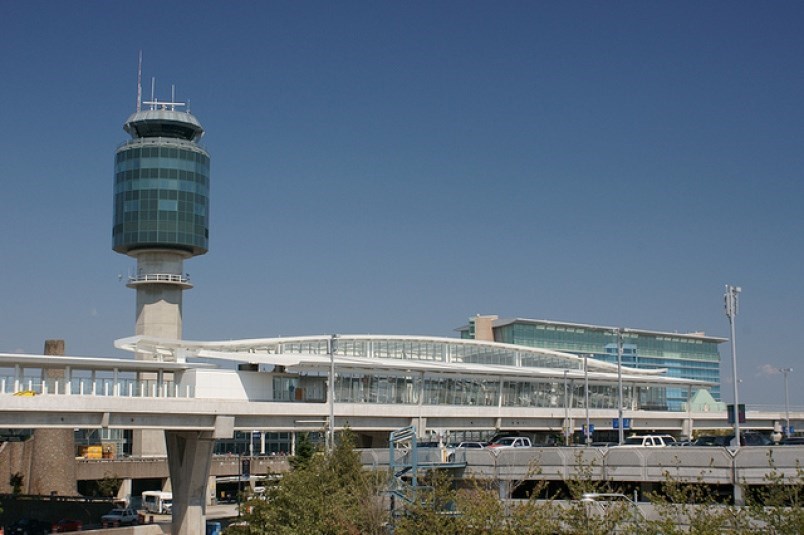Vancouver International Airport has unveiled its $135-million plan to reach net zero carbon emissions by 2030.
Globally, the airline industry emitted around 915 million tonnes of CO2 in 2019 – just over two per cent of man-made carbon emissions, according to the .
The airport authority announced earlier this year that it would be accelerating its original climate commitment by 20 years from 2050 – making YVR the first airport in Canada to commit to net zero emissions by 2030.
That target, which will also make the airport one of the greenest in the world, applies to the terminal building and infrastructure owned and operated by the Vancouver Airport Authority.
While the accelerated plan was announced prior to the Intergovernmental Panel on Climate Change’s latest report and B.C.’s deadly heat wave this summer, Marion Town, YVR’s director of climate and environment, told the Richmond News those were “strong reminders that we must all work on decarbonizing anything that we have responsibility for.”
“It certainly put a spring in our step to take action and continue on with our development of the roadmap.”
According to the roadmap, the 2030 target will be reached by switching to green vehicles, energy conservation and electrification in buildings, transitioning from fossil fuels to renewable alternatives and purchasing carbon removals to close any gap.
Implementing the measures outlined in the roadmap over this decade is estimated to cost up to $135 million in 2021 dollars.
While YVR has been financially impacted by the pandemic and cancelled a major infrastructure program last year – including its geoexchange system, central utilities building and parkade expansion – Town said the roadmap “anticipates a continuation of some impact of COVID over the next several years.”
“A lot of the more significant investments are being made in the latter half of the plan, but we have a slow and planned investment strategy between now and 2030, so it’s not like we’re sitting here, waiting until 2030, and then we’re doing all that investment.”
Town said the airport authority has plans to do “quite a bit” of energy conservation work on the terminal starting next year.
That work to conserve energy is the “most important thing” in the roadmap.
She said the airport authority emits 10,000 to 12,000 tonnes of carbon annually.
Most of those emissions come from use of natural gas for heating and cooking in the terminal building – parts of which were constructed in 1968 while others were completed as recently as last year.
“So we have not only B.C.’s biggest building, but a lot of different aspects to our ventilation, our lighting and our people-moving systems throughout that building,” Town said.
“So what that means is we have a job ahead in finding all of the right solutions to conserve energy, but we know we can do that within that building.”
This means, for example, using less natural gas in heating, ventilation, air conditioning (HVAC), and cooking, improving equipment efficiency, installing more LED lamps and optimizing solar thermal systems for heating water.
YVR is also working with BC Hydro and Fortis BC on energy conservation and projects to switch from natural gas to electricity.
Furthermore, in addition to downsizing its fleet of vehicles, the airport authority will switch its shuttle buses and light duty vehicles over to electric and invest in charging equipment.
However, it’s more challenging to electrify the heavy duty vehicles and equipment in the fleet, said Town.
“In fact, in some cases it’s impossible to find the electric version,” she said, noting YVR is also looking to see what’s being done around the world, such as Sweden’s work to produce an electric snow plow.
In these cases, the airport will switch to renewable diesel fuels, with a pilot phase set to begin next year followed by a larger rollout in 2027, according to the roadmap.
There will still be some residual emissions left over after that conservation and conversion work, according to Town.
To tackle this, the airport will transition from investing in carbon offsets to carbon removals, which directly “remove and sequester” carbon from the atmosphere, such as through restoring wetlands and bogs, direct air capture, carbon sequestration or agricultural soil carbon practices, according to the roadmap.
The roadmap will be reviewed each year, providing updates on initiatives, costs, effects and new data.
“We built a roadmap that has a solid pathway to get to zero, but we feel comfortable that there will be some substitutions that we’ll make along the way, that actually are a little bit cheaper or more innovative, or have a better and lasting effect for the planet.”
While the roadmap only applies to airport authority emissions, YVR notes the importance of also reducing emissions produced, for example, by airline partners and the airport community.
To help reduce these emissions, YVR said it is supporting the development of an ongoing supply of low carbon aviation fuel at the airport, providing ground power units to allow crews to shut down aircraft engines, investing in charging stations for airside ground equipment and vehicles and supporting tenant energy conservation.
In a statement, George Heyman, B.C.’s minister of environment and climate change strategy, and Ravi Kahlon, minister of jobs, economic recovery and innovation, said they applaud YVR’s climate leadership with its new 2030 roadmap.
“YVR has long demonstrated its commitment to the environment, innovation and a cleaner economy with a recognition that addressing climate change is now good for business and industry.
“This new commitment puts that change into action with tangible, practical steps to make YVR the first airport in Canada to commit to net-zero emissions by 2030.”

